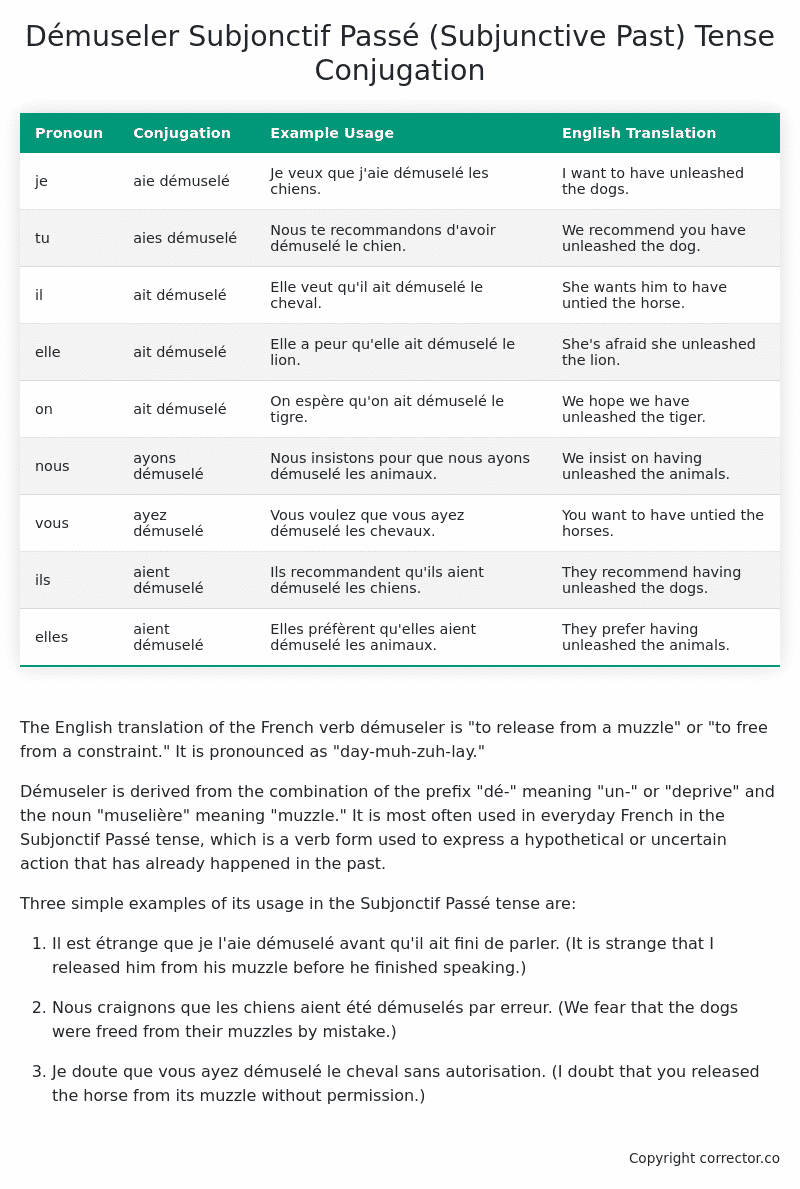Subjonctif Passé (Subjunctive Past) Tense Conjugation of the French Verb démuseler
Introduction to the verb démuseler
The English translation of the French verb démuseler is “to release from a muzzle” or “to free from a constraint.” It is pronounced as “day-muh-zuh-lay.”
Démuseler is derived from the combination of the prefix “dé-” meaning “un-” or “deprive” and the noun “muselière” meaning “muzzle.” It is most often used in everyday French in the Subjonctif Passé tense, which is a verb form used to express a hypothetical or uncertain action that has already happened in the past.
Three simple examples of its usage in the Subjonctif Passé tense are:
-
Il est étrange que je l’aie démuselé avant qu’il ait fini de parler. (It is strange that I released him from his muzzle before he finished speaking.)
-
Nous craignons que les chiens aient été démuselés par erreur. (We fear that the dogs were freed from their muzzles by mistake.)
-
Je doute que vous ayez démuselé le cheval sans autorisation. (I doubt that you released the horse from its muzzle without permission.)
Table of the Subjonctif Passé (Subjunctive Past) Tense Conjugation of démuseler
| Pronoun | Conjugation | Example Usage | English Translation |
|---|---|---|---|
| je | aie démuselé | Je veux que j’aie démuselé les chiens. | I want to have unleashed the dogs. |
| tu | aies démuselé | Nous te recommandons d’avoir démuselé le chien. | We recommend you have unleashed the dog. |
| il | ait démuselé | Elle veut qu’il ait démuselé le cheval. | She wants him to have untied the horse. |
| elle | ait démuselé | Elle a peur qu’elle ait démuselé le lion. | She’s afraid she unleashed the lion. |
| on | ait démuselé | On espère qu’on ait démuselé le tigre. | We hope we have unleashed the tiger. |
| nous | ayons démuselé | Nous insistons pour que nous ayons démuselé les animaux. | We insist on having unleashed the animals. |
| vous | ayez démuselé | Vous voulez que vous ayez démuselé les chevaux. | You want to have untied the horses. |
| ils | aient démuselé | Ils recommandent qu’ils aient démuselé les chiens. | They recommend having unleashed the dogs. |
| elles | aient démuselé | Elles préfèrent qu’elles aient démuselé les animaux. | They prefer having unleashed the animals. |
Other Conjugations for Démuseler.
Le Present (Present Tense) Conjugation of the French Verb démuseler
Imparfait (Imperfect) Tense Conjugation of the French Verb démuseler
Passé Simple (Simple Past) Tense Conjugation of the French Verb démuseler
Passé Composé (Present Perfect) Tense Conjugation of the French Verb démuseler
Futur Simple (Simple Future) Tense Conjugation of the French Verb démuseler
Futur Proche (Near Future) Tense Conjugation of the French Verb démuseler
Plus-que-parfait (Pluperfect) Tense Conjugation of the French Verb démuseler
Passé Antérieur (Past Anterior) Tense Conjugation of the French Verb démuseler
Futur Antérieur (Future Anterior) Tense Conjugation of the French Verb démuseler
Subjonctif Présent (Subjunctive Present) Tense Conjugation of the French Verb démuseler
Subjonctif Passé (Subjunctive Past) Tense Conjugation of the French Verb démuseler (this article)
Subjonctif Imparfait (Subjunctive Imperfect) Tense Conjugation of the French Verb démuseler
Subjonctif Plus-que-parfait (Subjunctive Pluperfect) Tense Conjugation of the French Verb démuseler
Conditionnel Présent (Conditional Present) Tense Conjugation of the French Verb démuseler
Conditionnel Passé (Conditional Past) Tense Conjugation of the French Verb démuseler
L’impératif Présent (Imperative Present) Tense Conjugation of the French Verb démuseler
L’infinitif Présent (Infinitive Present) Tense Conjugation of the French Verb démuseler
Struggling with French verbs or the language in general? Why not use our free French Grammar Checker – no registration required!
Get a FREE Download Study Sheet of this Conjugation 🔥
Simply right click the image below, click “save image” and get your free reference for the démuseler Subjonctif Passé tense conjugation!

Démuseler – About the French Subjonctif Passé (Subjunctive Past) Tense
Formation of the Subjonctif Passé
Everyday Usage Patterns
Interactions with Other Tenses
Present tense
Future tense
Conditional
Summary
I hope you enjoyed this article on the verb démuseler. Still in a learning mood? Check out another TOTALLY random French verb conjugation!


